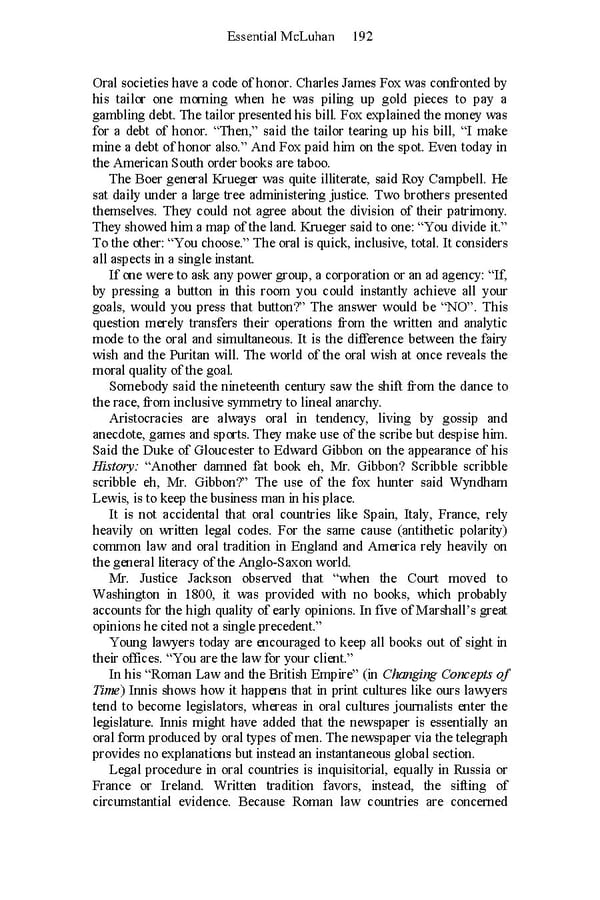Essential McLuhan 192 Oral societies have a code of honor. Charles James Fox was confronted by his tailor one morning when he was piling up gold pieces to pay a gambling debt. The tailor presented his bill. Fox explained the money was for a debt of honor. “Then,” said the tailor tearing up his bill, “I make mine a debt of honor also.” And Fox paid him on the spot. Even today in the American South order books are taboo. The Boer general Krueger was quite illiterate, said Roy Campbell. He sat daily under a large tree administering justice. Two brothers presented themselves. They could not agree about the division of their patrimony. They showed him a map of the land. Krueger said to one: “You divide it.” To the other: “You choose.” The oral is quick, inclusive, total. It considers all aspects in a single instant. If one were to ask any power group, a corporation or an ad agency: “If, by pressing a button in this room you could instantly achieve all your goals, would you press that button?” The answer would be “NO”. This question merely transfers their operations from the written and analytic mode to the oral and simultaneous. It is the difference between the fairy wish and the Puritan will. The world of the oral wish at once reveals the moral quality of the goal. Somebody said the nineteenth century saw the shift from the dance to the race, from inclusive symmetry to lineal anarchy. Aristocracies are always oral in tendency, living by gossip and anecdote, games and sports. They make use of the scribe but despise him. Said the Duke of Gloucester to Edward Gibbon on the appearance of his History: “Another damned fat book eh, Mr. Gibbon? Scribble scribble scribble eh, Mr. Gibbon?” The use of the fox hunter said Wyndham Lewis, is to keep the business man in his place. It is not accidental that oral countries like Spain, Italy, France, rely heavily on written legal codes. For the same cause (antithetic polarity) common law and oral tradition in England and America rely heavily on the general literacy of the Anglo-Saxon world. Mr. Justice Jackson observed that “when the Court moved to Washington in 1800, it was provided with no books, which probably accounts for the high quality of early opinions. In five of Marshall’s great opinions he cited not a single precedent.” Young lawyers today are encouraged to keep all books out of sight in their offices. “You are the law for your client.” In his “Roman Law and the British Empire” (in Changing Concepts of Time) Innis shows how it happens that in print cultures like ours lawyers tend to become legislators, whereas in oral cultures journalists enter the legislature. Innis might have added that the newspaper is essentially an oral form produced by oral types of men. The newspaper via the telegraph provides no explanations but instead an instantaneous global section. Legal procedure in oral countries is inquisitorial, equally in Russia or France or Ireland. Written tradition favors, instead, the sifting of circumstantial evidence. Because Roman law countries are concerned
 Essential McLuhan Page 198 Page 200
Essential McLuhan Page 198 Page 200